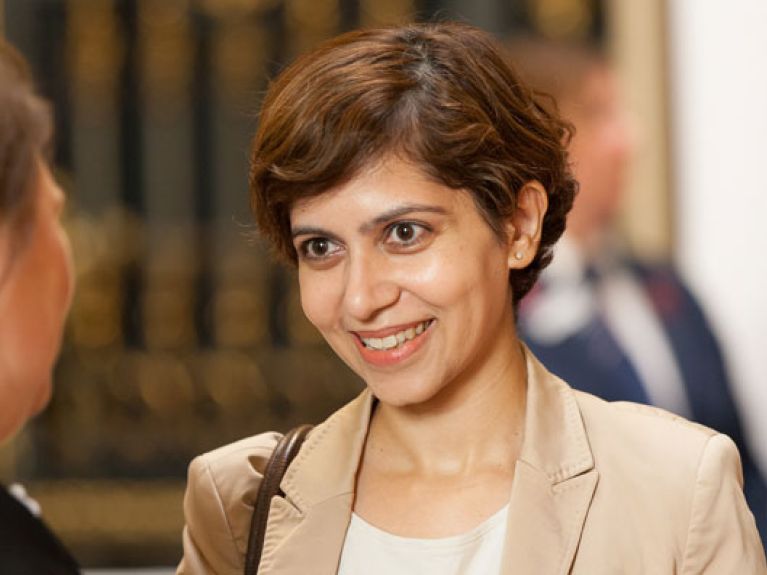“An extremely important forum”
Four questions on the G20 summit in Hangzhou, China, for Professor Amrita Narlikar, President of GIGA German Institute of Global and Area Studies.

Prof. Narlikar, on 4/5 September G20 representatives will meet in China. There is a growing demand for global governance. Is the G20 an appropriate forum for that?
I think the G20 is an extremely important forum for facilitating global cooperation. It is key that the leaders of the world’s largest economies meet on a regular basis to discuss and try to find solutions to some very difficult problems. The value of the G20 was borne out clearly in the aftermath of the global financial crisis of 2008. This financial crisis could have easily developed into another Great Depression of 1929, which continued to wreak economic turmoil and political havoc through the 1930s. A critical reason why this did not happen was because of the G20. The G20 provided the world’s major economies with a forum to coordinate their actions, improve financial regulation, reform financial institutions, and above all avoid a resort to the beggar-thy-neighbour policies that had exacerbated the Great Depression.
What are currently the major issues?
The world economy continues to face some very serious challenges today. Look at the deadlocks that plague the Doha negotiations of the World Trade Organization. Look at the anti-trade sentiment – indeed anti-globalisation sentiment – spreading across economies, and this despite the fact that all the data points to the overwhelming gains of globalisation across countries. Brexit, in my eyes, was yet another example of the backlash against globalization. Europe has faced a major brunt of the refugees’ crisis, but this is also a global issue that needs a global solution. These problems are very serious. No one country has the will or the ability to solve them on its own. And this is precisely why we need leaders of the systemically-significant economies – the G20 economies – to come together and explore feasible solutions.
That said, I think two caveats are worth highlighting. First: The G20 is often mistakenly seen as a substitute or a replacement for international organizations, such as the United Nations or the World Trade Organization or the International Monetary Fund. It is extremely important to recognise that this is not the case, nor should it become the case. Misunderstandings like this risk saddling the G20 with unfair expectations and a mandate that is almost impossible to fulfil, and then also raise some grave questions about its legitimacy and accountability. The G20 is not an international organization. Rather, through the proposals that it comes up with, it has the potential to develop focal points around which international organizations may be able to build a feasible consensus.
Second: The G20 is a leaders’ level forum for the world’s leading economies. But it is not just that. There are other processes associated with it, such as the T20 (involving the think-tanks and research institutes) and C20 (involving civil society). These provide potentially valuable resources that the leaders’ summits can draw on. They are also important routes whereby the leaders can connect with their diverse stakeholders. If used well, they can serve as a source of both innovative ideas to combat international problems and also create legitimacy and ownership of the solutions. So for the G20 to fulfil its real potential, we need some effective feedback loops that connect the leaders’ level with the other parts of the process.
The interests of industrialised nations and rising powers are not exactly identical. How can they be brought together?
This depends on the issues. Not all issues involve zero-sum games, i.e. games where the gains of the industrialised countries come at the expense of the developing countries/ rising powers, or vice versa. There are also negotiation strategies and payoff structures that one can develop to try and convert zero-sum games into positive-sum games. And it is sometimes also important to recognise and acknowledge the deal-breakers – there are some issues where conflict is so fundamental and over principles that one would just never reach an agreement – and then negotiators have to decide whether this particular issue should really be on the agenda at all. Fortunately, however, I think many of the problems that the G20 is addressing are in the first two categories, and not the third one of fundamental conflict. And in these categories – such as trade, financial regulation, climate change mitigation, sustainable development – it should be possible to reach agreement between the developed countries and the rising powers, especially in a setting like the G20.
From your perspective, what is Germany’s role in this international process?
Germany can, and should, play a key role in this process. The next G20 summit will be in Hamburg in 2017. So it is very important that Germany helps in actively setting the agenda for the current summit in China, helps establish the necessary continuities for the Hamburg summit, and further helps ensure follow-through into future summits. I think Germany comes to the negotiating table with very convincing credentials. It is not only a major economy, but it has a well-deserved reputation of being an effective and reliable negotiator (as illustrated, for instance, in the role that it played in the Iran negotiations). Plus there are some important opportunities opening up – for instance Agenda 2030 – and we know that sustainable development is an issue on which Germany has a long-standing interest and commitment. So there’s a lot of good that Germany could do as part of the G20 process, and this is all the more important as it comes at a time when the world desperately needs such initiative and leadership.
G20 summit, 4 to 5 September 2016 in Hangzhou, China

